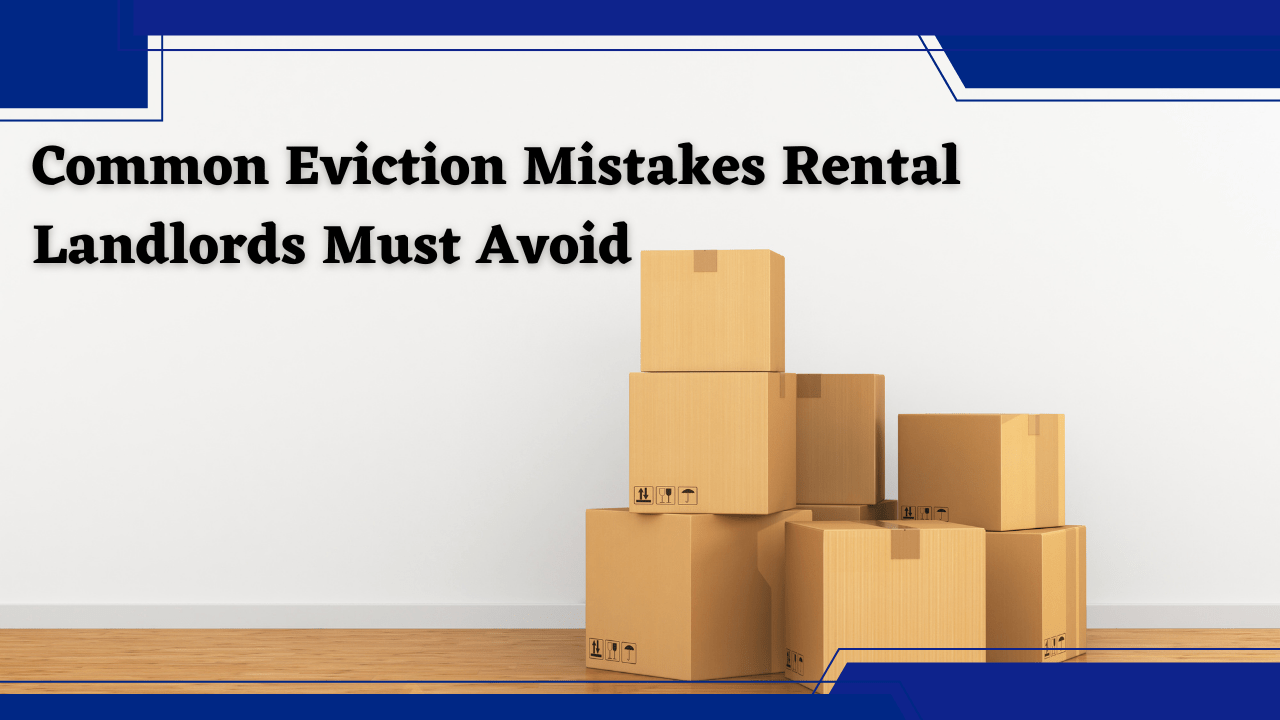
The eviction process in Ohio isn’t terribly complicated as long as you have a good reason for eviction and you’ve exhausted all of the required steps that lead up to it.
That doesn’t mean it’s easy.
In fact, we often get called to help owners who have run into problems trying to evict a tenant. Mistakes are easy to make, and unfortunately, those mistakes are usually expensive and time consuming. They can result in your eviction case being thrown out. In some cases, the tenant you’re trying to evict can sue you for illegal actions.
Any time we talk to rental property owners about eviction, we strongly recommend they work with an experienced landlord and tenant attorney or talk to a Cleveland property manager. Having some legal resources and professional expertise protects you and ensures you get your property back as quickly as possible.
Here are some of the most common eviction mistakes we see.
Make sure you’re doing everything you can to avoid them.
Are You Focused on Preventing Eviction?
The first mistake is as simple as not preventing eviction.
Evicting a tenant is a terrible experience for everyone, including you. If you’re a good landlord and a proactive property owner, you’ll do everything you can to avoid the eviction process. It should be a last resort, always.
Rushing right to the courthouse is a mistake. Evaluate your processes and make sure you have some good systems in place to ensure that eviction is rare. Here’s what we mean:
-
- Screen Tenants Carefully
Don’t rent to tenants who have a history of evictions. During the screening process, make sure you’re closely evaluating their rental history. Talk to former landlords if you can. Ask if rent was paid on time and if they took good care of the property. Check for prior evictions. Someone who was evicted 20 years ago and can demonstrate a good rental history since then is probably a risk worth taking. A tenant who has been evicted twice in the last five years, however, is not a tenant you want in your property.
-
- Establish a Strong and Consistent Rent Collection Policy
The most common reason that landlords evict tenants is the nonpayment of rent. Do you have a system in place that prevents the late and missing rent payments that often lead to eviction? Make sure you share your rent collection policy with your tenants before they move in, and then reinforce it throughout the tenancy. Your lease agreement should reflect all the consequences of paying rent late, including late fees and the potential for eviction.
-
- Develop Good Tenant Relationships
You’re less likely to have to evict a tenant with whom you have a positive and respectful relationship. Make sure you’re putting every effort into working well with your residents. Eviction will be rare.
-
- Work With Tenants on Late Rent
Always be willing to avoid eviction. Sometimes, a good tenant will have a sudden financial issue. That doesn’t mean they’ll never be able to pay rent on time again. It simply means that they might need a bit of flexibility one month. If we learned anything during the eviction moratorium, it’s that most tenants want to pay their rent and stay in their home. Be willing to consider payment arrangements and agreements in order to prevent eviction.
Make eviction prevention a big part of your rental strategy. You’ll find it leads to a happier and more profitable rental experience. It’s always a mistake to over-use eviction.
Is Your Lease Agreement Strong and Specific?
It’s a mistake that always surprises us – not having a written lease agreement.
If you let your tenant move in without a signed lease agreement, it may take you some extra time to evict that tenant. The judge will want to see a lease when you show up in court, trying to get possession of your property back. If you don’t have one, things can get complicated.
Make sure you have your tenants sign a lease agreement that includes your rent collection policy. It should include all the consequences of late or unpaid rent – including eviction. Don’t rely on a verbal agreement. Use a lease template that’s both legally enforceable and legally compliant in Ohio.
You want the lease to be strong and specific about your rights to evict. In Ohio, you need to show probable cause for evicting a tenant before the lease term ends. The lease should protect you and your rights, so make sure you have one and make sure it helps you when you need to get your property back.
Evicting in Ohio Without Cause
As a landlord in Ohio, you cannot evict a tenant unless you have cause.
If you do not have legal cause to evict a tenant, you must wait until the end of the lease term before you can ask the tenant to move. It’s a mistake to try and remove your tenant during the lease term without a legally acceptable reason.
Here are what those reasons might be:
-
- Nonpayment of rent
- Lease violations
- Conducting illegal activity at the property
- Health or safety violations
You can also elect not to renew the lease agreement when the lease term comes to a close.
Don’t try to evict your tenant for no reason before the end of the lease term. It violates the lease agreement you signed.
Proper Notice Periods and Cleveland Evictions
You can’t simply show up in court to begin the eviction process in Cleveland. You need to start with some paperwork that’s served to your tenant.
A common mistake that landlords make is thinking that they can simply show up in court and get an eviction order. It’s not that easy.
Before you go to court for the eviction filing, you need to serve a notice to comply. When rent is not paid, this is typically a Three Day Notice to Pay or Quit. This will tell them that they have three days to pay the amount of rent that’s due or move out of the property.
Don’t skip this step. You won’t go very far in your eviction if you cannot prove this notice was lawfully served to your tenants.
Taking Illegal Eviction Actions
It’s frustrating when you want your tenants out but you’re stuck waiting for the legal green light to change the locks and move on with your life. You cannot, however, take matters into your own hands.
One of the worst mistakes you can make while evicting your tenants is to do something illegal, such as changing the locks on your own.
You have to remain professional and you have to follow the legal process when you’re evicting. This means that you cannot change the locks and refuse to give your tenants the new keys. You cannot move all of their stuff out to the curb and kick them out yourself. You cannot have the water or the lights shut off. You cannot show up at the property to confront them.
Follow the legal process. It’s the only way to remove them from your property without getting in legal trouble yourself. If you know yourself well enough to know that there’s a chance you’ll become emotional or angry, have an attorney or a property manager handle the eviction for you.
Not Being Prepared for Court
When your court date arrives, you might be so eager or anxious that you forget to prepare properly for it.
When you finally have the opportunity to show up in court and tell the judge why your tenants should be evicted, always be ready. It’s a mistake to just show up and expect the court to trust your word. You need to bring copies of:
-
- Your lease agreement
- Your Three Day Notice
- Any other correspondence regarding overdue rent
- Your accounting ledger that shows unpaid rent accounts
- A copy of your Summons and Complaint
Be ready to demonstrate that you have exhausted every process for getting your tenants to come into compliance and pay the rental amount. When you follow the law to the letter, you’ll get the outcome you want.
It’s a Mistake to Evict Alone
 Get professional help when you need to evict.
Get professional help when you need to evict.
We hammer this point home a lot, but that’s because working with a Cleveland property manager or an experienced eviction attorney will make such a big difference in the process of removing a tenant. You’ll avoid all the common mistakes, and do a better job of protecting yourself and your property.
Document everything that leads you to the point that you decide it’s time to evict. Then, turn the file over to a professional who understands the process and has been here before. Your eviction will be shorter, less costly, and far less stressful.
If you have any questions about how to effectively and lawfully evict a tenant from your Cleveland rental property, please contact us IIP Management. We work with owners in Cleveland Heights, Lakewood, Lyndhurst, Parma, Solon, and South Euclid (Cuyahoga County).
